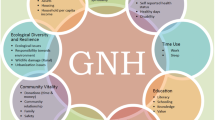Abstract
This article offers a way to acknowledge the human right of indigenous people to be actively involved in developing and determining their own development. It challenges the social work profession to consider an indigenous worldview in development. To accomplish this, four main challenges of the concept and social movement of Buen Vivir (or Living Well) from Latin American indigenous communities represents for the current parameters of the social work profession are discussed: the idea of development and the outcome approach; the idea of what a good life means; ethical individualism; and anthropocentrism.
Similar content being viewed by others
References
Acosta, A. (2012). The Buen Vivir. An opportunity to imagine another world. In Heinrich Böll Foundation (Ed.), Inside a champion. An analysis of the Brazilian development model. Berlin: Publication Series on Democracy.
Deneulin, Séverine (2012) Justice and deliberation about the good life: the contribution of Latin American buen vivir social movements to the idea of justice. Working Paper. Bath: Centre for Development Studies (Bath Papers in International Development and Well-Being; 17).
IFSW (2014) Global definition of social work. Retrieved January 18, 2016 from http://ifsw.org/get-involved/global-definition-of-social-work/
OHCHR (2007) Declaration in the rights of indigenous peoples. Retrieved February 19, 2018 under: https://daccess-ods.un.org/TMP/961394.309997559.html
Prada Alcoreza, R. (2013). Buen Vivir as a model for state and economy. In M. Lang, L. Fernando, & N. Buxton (Eds.), Beyond development. Alternative visions from Latin America. Permanent working group on alternatives for development. Amsterdam: Transnational Institute/ Rosa Luxemburg Foundation.
Thole, W. (2010). Die Soziale Arbeit - Praxis, Theorie, Forschung und Ausbildung. Versuch einer Standortbestimmung. In W. Thole (Ed.), Grundriss Soziale Arbeit. Ein einführendes Handbuch 3., überarbeitete und erweiterte Auflage. Wiesbaden: VS Verlag für Sozialwissenschaften.
Varese, S. (1996). The New Environmentalist Movement of Latin American Indigenous People. In S. B. Brush & D. Stabinsky (Eds.), Valuing Local Knowledge: Indigenous People and Intellectual Property Rights. Washington D.C.: Island Press.
Author information
Authors and Affiliations
Corresponding author
Additional information
Publisher’s Note
Springer Nature remains neutral with regard to jurisdictional claims in published maps and institutional affiliations.
Rights and permissions
About this article
Cite this article
Gerlach, M. The Concept of “Buen Vivir” and the Social Work Profession. J. Hum. Rights Soc. Work 4, 116–118 (2019). https://doi.org/10.1007/s41134-018-0081-4
Published:
Issue Date:
DOI: https://doi.org/10.1007/s41134-018-0081-4




